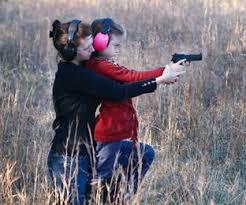
U.S. teens who report being bullied are three times more likely to say they have access to loaded guns than kids who weren't bullied, a new study found.
"Interventions, training and policies (are needed) to protect the wellbeing not only of these students, but their fellow students, their neighborhoods and their communities at large," said lead author Maayan Simckes, of the University of Washington in Seattle.
Access to guns is a risk factor for injury and death - and that risk may be exacerbated among youngsters already at high risk for these outcomes, such as bullied teens, Simckes and her colleagues write in the Journal of Adolescent Health.
Past studies found bullied teens carry guns more often than those not bullied, but little is known about their access to those weapons, the researchers write.
They used data collected from a nationally representative sample of 10,704 adolescents participating in the National Crime Victimization Survey. In addition to asking respondents about past bullying, the survey also asks if the teens have access to a loaded gun without adult permission.
That could mean, for example, that the teen knew how to get a gun from a safe and load it without asking an adult for help or a key.
Overall, 4.2 percent of teens said they had access to a loaded weapon without adult permission.
Nearly 19 percent of students reported traditional bullying that may be faced in school or on the playground, about 2 percent reported cyber bullying over the internet and about 6 percent reported both types of bullying.
Among the nearly 74 percent of students who weren't bullied, about 3 percent reported access to a loaded gun without adult permission. That proportion rose to about 5 percent among teens who experienced traditional bullying, and to 9 percent among those who were victims of cyber bullying.
In the group of teens who reported both traditional and cyber bullying, 15 percent reported access to a loaded gun without adult permission.
Simckes told Reuters Health that the new study can't explain why bullied teens are more likely to have unrestricted access to loaded guns. Future research needs to examine that question.
Additionally, people should understand the close relationship between gun access and bullying, Simckes said.
"For example, in pediatric offices, when we have conversations about gun access, we should also be discussing bullying," she said.
Dr. Andrew Adesman, of Northwell Health's Steven and Alexandra Cohen Children’s Medical Center in New Hyde Park, New York, recently found bullied teens are more likely to bring guns to school.
"Obviously, you can’t bring a gun to school unless you have access," he told Reuters Health.
The risk that teens will bring a gun to school goes up even more when they face threats of physical violence, said Adesman, who wasn't involved with the new study.
He said gun owners need to take precautions.
"Parents who are responsible gun owners should make sure they have their weapons secured," said Adesman.
Source: Reuters
http://www.reuters.com/article/us-health-bullying-guns-idUSKBN19J2XA
 FR
FR EN
EN AR
AR








